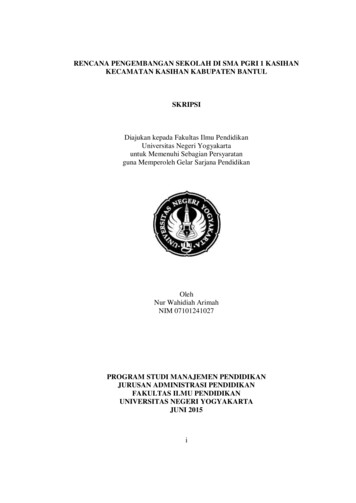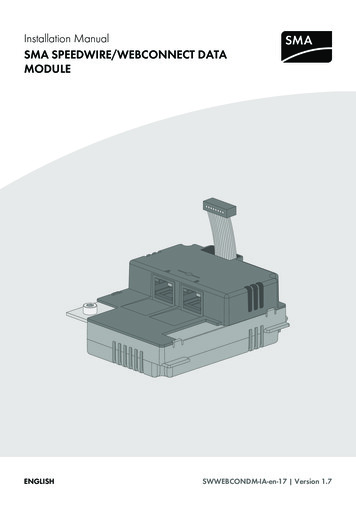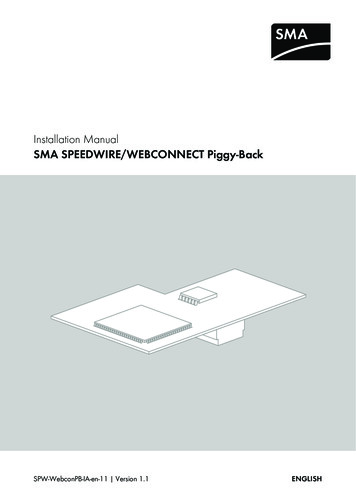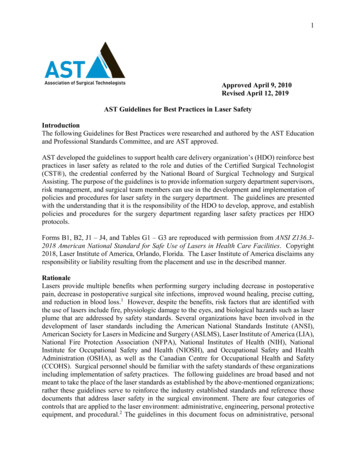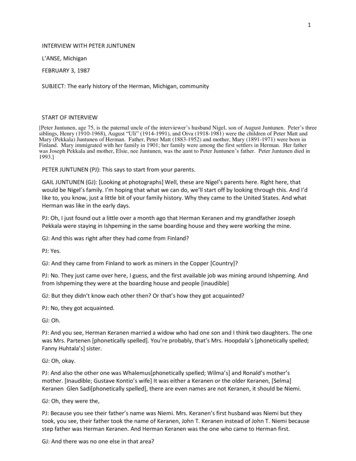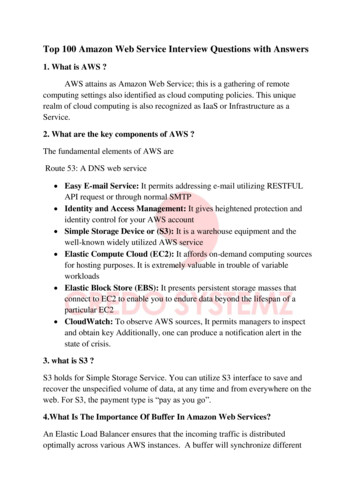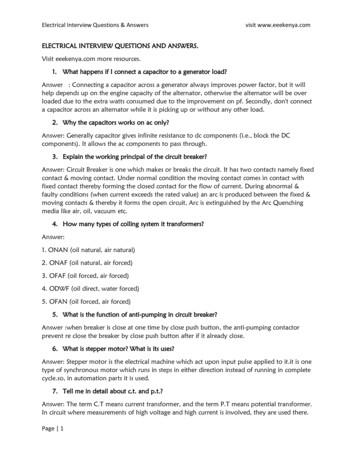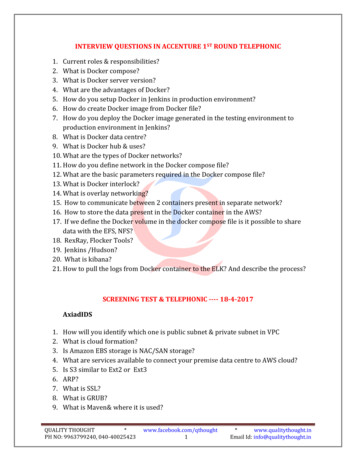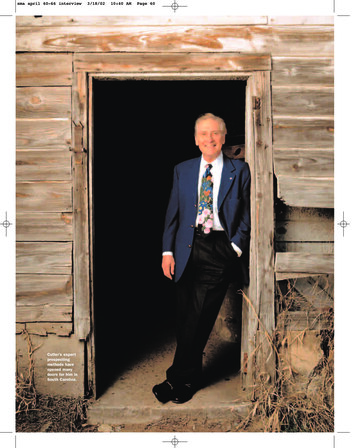
Transcription
sma april 60-66 interviewCutler’s expertprospectingmethods haveopened manydoors for him inSouth Carolina.3/18/0210:40 AMPage 60
sma april 60-66 interview3/18/0210:46 AMPage 61cover storyTake Me Home COUNTRY ROADabout burial costs. Just 20 years afterfounding Cutler and Associates, Shepmade final expense the primary focusof his insurance agency.Whether or not Cutler was boldenough to to give himself the nicknameKing of Final Expense, he has become agreat cultivator of selling talent nationwide. It’s this reputation that broughtSenior Market Advisor to Columbia touncover these royal marketing tips:Interviews Karl LuedersPhotography Milton Morris“Everybody’s good at something.”That’s what your mother wouldtell when you realized youcouldn’t hit a curve ball or you got a Din math. “.it just takes people a while tofigure it out.” That was the catch.Shepherd “Shep” Cutler didn’t needmuch time to figure out he was good atselling insurance. Born and raised inSouthern California, Cutler movedwith his family to South Carolina whenhe was 19. There, he enrolled in theUniversity of South Carolina, but aftera few weeks, knowing his father wasunable to work because of a stroke,Cutler took a part-time job sellinghospitalization insurance. Cutler likedthe work — and the pay — so muchthat he turned it into a full-time joband never went back to college.“I took the job thinking that I wouldbe going back to school, but never did,”says Cutler. “Of course, after you’vebeen in this business three or four years,you’ve got a renewal chain coming inthat can deflect your interest fromschool. But I have no regrets.“It’s funny, we’ve had a number of college guys that wouldtake six months to a year off and come work for us. I wouldtell them about my experience, but make sure they wentback to school.”Cutler’s life experience piled up quickly. By the mid1960s, he started his own insurance company, right aboutthe time Medicare developed supplements, which he beganmarketing aggressively. It was through these Medicare supplement sales that Cutler began to hear seniors’ concernsAfter almost threedecades of marketingfinal expense insurance, Shep Cutlertakes a rural route tosenior clientsSMA: Describe in more detail howyou became a final expense specialist.SC: We actually started writingMedicare supplements back in 1965when Medicare first came out. As yearswent by, our policyholders would ask,“Do you have anything for cash burial oris it possible to get another 3,000 or 5,000 worth of life insurance?” At thattime in the late ’60s, you really didn’thave a lot of that, so we had a hard timeaddressing it. Around the mid-’80s,several carriers started coming out withfinal expense plans that seemed fairlyreasonable. But we wouldn’t get into themarket until some of the triple A-ratedcompanies gave what we thought werefine-tuned products.SMA: But you were there in the early days to help fill thevoid for seniors who wanted to cover burial costs.SC: That’s right.SMA: Do you think that seniors know how much a funeral costs, but they don’t really think about it until theworst possible time?SC: That’s so true. But when a person 65 to 70 years oldApril 2002 Senior MarketAdvisor61
sma april 60-66 interview3/18/0210:49 AMPage 62cover storylearns that he or she can handle it for about 20 or 30 amonth and increase their estate by 5,000 (see “30 Years ofExperience in 30 Seconds”), they’re very, very receptive tothat. When new brokers learn about final expense, chances arethat the last names on those first applications will be the same[as the brokers’]. What they’ve done is they’ve either writtenthemselves, a brother or a parent because they realize this is avery important product.SMA: The immediate family is always a captive audience,but I assume the hardest part about selling such an obvious product is getting in front of the right audience.SC: That’s right. We’ve found some very effective lead programs such as newspaper inserts, magazines and direct mail.Those ads give examples of what a final expense plan wouldcost at age 65 or 70 or 75, and then we get inquiries from thegeneral public. Right now, I would say that final expense is oneof the hottest products in the senior market.SMA: What are the most effective ways to prospect forfinal expense clients?SC: We have found that a newspaper insert on a regular basisseems to be very effective. A newspaper insert saying something like “Final expense up to 35,000 if you can qualify.Most people do qualify.” And then, of course, we show thepremium and include a business reply card they can sendback. That’s one of the best ways. A personal producing general agent can spend 500 or 600 on 10,000 of those and geta return of maybe half a percent. That’s one of the betterprospecting ways.We also use direct mail. We found that that’s not quite aseffective, but it still is fairly good. And then we have magazines throughout South and North Carolina that go to anybody and everybody who has electricity. Those co-opmagazines have mostly a rural readership. And those peopleseem to have more time to look at things such as that. We do alittle bit of telemarketing but not an awful lot. Between thefour, we can keep agents fairly busy with good new prospects.SMA: When you talk about an insert are you talkingabout a sheet of paper that falls out of the newspaper?SC: Right. We have a perforated business reply card right onCont’d. on page 64The Education ofHoward Catchings“People buy from who they know” and otherpearls of wisdom from Mississippi’s Burial Man.Catchings served double duty early in his career, teaching elementaryschool by day and selling encyclopedias and insurance at night.ll Howard Catchings ever wanted to do was wear a necktieto work. Considering his background, that was a pretty loftygoal. Growing up in rural Mississippi in the early 1940s, Catchings’ dream seemed as far off as becoming an astronaut. Howard’sfather died when he was young, forcing his mother to find workto care for Howard and his three brothers. “Since I was theoldest,” says Catchings, “during that time, I was something of aman of the house and I started trying to be responsible.”Sales intuition developed early for Catchings, who startedselling two different newspaper subscriptions at the age of 9 tohelp with money. “I sold the Jackson Daily News and TheClarion-Ledger. When a new paper came in town, they foundme to help them sell it. I guess that’s how I got my selling career started, not knowing I was preparing for my future.”Still, Catchings’ prospects looked bleak. At the time, rolemodels in Jackson — where Catchings’ family finally settled —were few. “There were teachers and preachers, and I didn’twant to be a preacher,” remembers Catchings. In 1963, aftergraduating from Jackson State University, Catchings beganteaching. The only other man in Catchings’ school was theprincipal, who implored Howard to remain a teacher so heCont’d. on page 6462Senior Market Advisor April 2002PHOTO BY GIL FORD PHOTOGRAPHYA
sma april 60-66 interview3/18/0210:52 AMPage 64cover storyit. They just take the postcard off that says, “Yes I’m interestedin more information on your final expense plan,” and theysend it back to us. That’s really tried and true. I think it’s probably the best prospecting program there is.There are some programs that say, “You will receive aMedicare supplement book,” or “You’ll receive some information on Social Security.” And people send it in thinking that’swhat they’re gonna get. We don’t like to do that. We actuallylike to spell out what it is. Our return is a lot less but then thereturn is a quality return.SMA: Do these leads turn into a seminar presentation ordo you do all one-on-one?SC: One-on-one.SMA: And do you go to their home or do they come toyour office?SC: Well, generally we go to their home, because you’re inthe country, but some people would rather come to our office,which is centrally located in the state. But I would say 85 to 90percent of the sales are made in the prospect’s home.SMA: What do you think the closing rate is forthis kind of product?SC: It depends on the producer but I would say that theclosing rate would go anywhere from a minimum of 33 percent — almost one out of three will take the policy away fromyou, they want it so much — to as high as 70 percent.SMA: Is there a higher commission on final expense?SC: Yes there is. With final expense your compensation runsmaybe even 20 percent more than it does on long term careinsurance in the first year. After the first year, of course, yourcommission drops considerably whereas, with Medicare sup-Cutler’s most lucrative market is farm country: “It just seems likepeople in rural areas have a little bit more time to talk to you.”plements, it’s usually level. Even long term care gives you alarger second-year and subsequent-year commission. But finalexpense will drop maybe 90 percent between the first andsecond year.SMA: What percentage of your business comes frompeople over the age of 50?SC: About 80 percent. It is a senior market, no doubt about it.SMA: Do you find that when you’re selling to seniors,you get a lot of the sons and daughters interested in theproduct when they see how reasonable the policy is, or isHoward CatchingsFrom page 62could serve as a role model for the hundreds of boys that came through hisschool system with little or no paternalinfluence. Despite the 3,400-a-yearsalary, Catchings enjoyed helpingyouths similar to himself whilebuilding community ties. until, asCatchings puts it, “Needmore got onmy back.” Needmore?“Need more money.” To solve thatproblem, Catchings began selling encyclopedias after school until an insuranceagent came to his school to sell a lifeinsurance-type savings plan. “He knewone person in that school but sold a64Senior Market Advisor April 2002policy to 31 out of 33 people. When hecame to my house, I told him, ‘How doyou sell these things? Because I couldhave sold to all 33.’ So he gave me aninterview and told me he would comeback to train me a few days later. By thetime he showed up, I already had 19checks and applications.”It’s this opportunism that drew Catchings to final expense, or “burial insurance,” as he prefers to call it. Most of theinsurance salesmen at the time were onlyselling policies to the teachers and theprincipals in the Jackson school system,but Catchings realized that the majorityof the people employed by the schoolswere blue-collar workers who probablydidn’t have a checking account. Insteadof competing with white agents in theeducated black market, Catchings extended his reach, becoming the insurance agent for the everyman.By 1980, Catchings retired fromteaching and concentrated on burialinsurance full-time. His productionskills earned him Million Dollar RoundTable status, including three appointments to the Top of the Table. Moreimportantly, his community networkingskills have earned him status in Jacksonthat no other African-American hadCont’d. on page 66
sma april 60-68 interview3/20/028:33 AMPage 66cover storyit a separate marketing tack to get those under 50?SC: What we find is the children of the client that we’retalking to recommend final expense highly and want theirparents to take something like this out. Of course, it couldevolve into insurance on the children, but all that happens isthat the parents get a pat on the back from children.SMA: You mentioned that part of your marketing goes outto rural areas. Granted, Columbia’s not Los Angeles, butColumbia is an urban center in South Carolina.SC: It’s all rural for the most part. For example, we really don’twrite an awful lot of business in Charleston, Greenville or Columbia, but we do write in the suburbs and out in the rural areasfrom those cities. You’re going to write an awful lot of business infarm country; you might want to say it’s blue-collar but it isn’tnecessarily blue-collar. It just seems like the people in the ruralareas have a little bit more time to talk to you. I think they readthings in the newspaper a little bit closer. Conservatively, 75 to80 percent of our business comes from the rural areas.SMA: Do you find a way to package different insuranceproducts into one sale, or is final expense a one-stop deal?SC: That’s a good question. If you are talking to someoneabout final expense, it is natural to ask the client about theirMedicare supplement coverage. If they happen to have aMedicare supplement and they are paying more money thanthe company you’re representing, many times you canpackage both of them together. It’s a terrific door opener be-30 Years of Experience in 30 SecondsShep Cutler’s been selling final expense plans foralmost 30 years. You can tap this knowledge inthe time it takes you to read his presentation:“Mr.Jones, I’m glad you’ve made an inquiry about ourfinal expense plan. And I want to let you know that today,before I leave your house, I’m going to be able to increaseyour estate by 5,000. Now you can use that 5,000 for anything you feel is necessary. You might want to use that forfinal expense cash burial or you might want to earmark thatfor some of the bills that go on after you’ve passed away.Maybe it’s the electric bill; maybe you may want to leave it toa church or you may want to leave it to a charity, that’s entirely up to you. But I’ll be able to increase your estate today by 5,000 and at your age, Mr. Jones, 65 years old, the premium will be 26.55 a month. How does that sound to you?”cause the final expense product itself is inexpensive. Oncepeople have confidence in you, you can talk to them aboutMedicare supplements or a long term care insurance product.SMA: When you’re pitching final expense, how do youcompare it to a pre-need plan from a funeral home?SC: When we have run into it, basically we’re saying [the finalHoward Catchingsachieved before him. He was the firstblack chairman of the Jackson Chamberof Commerce and Junior Achievement;he became the first black president ofthe General Agents Conference, and thisJuly, he’ll be named president of thelocal Rotary Club. As a result, Catchingshas become known as Mississippi’s“Burial Man.”“I’ve found that people do businesswith people they know,” says Catchingsnow 62, but showing few signs ofslowing. “I used to think it was a wasteof time, but now, if people know you,they trust you and they see you’re doingsomething good for free, you might welldo your work just as well.”Below is some more sales wisdom onselling final expense, er. burial insurance, from the man who believes this isthe one product everybody needs:Door-to-door sales. I used to knock on66Senior Market Advisor April 2002Catchings has been a Jackson mainstayfrom the school desk to the kitchen table.doors selling mortgage cancellation andlife insurance. When a person wouldmove into a new neighborhood, I wouldhelp them move their furniture in. ThenI would sell them. I used to be knownWhat’s in a name? Calling burial finalexpense is just as bad as calling it lifeinsurance because people might notknow what that is. But everybody, whitefolks, black folks, pink, yellow, orange.understands when you say “burial.” [Myagency] sells anywhere between 15,000to 20,000 applications a year.If you say “life insurance,” that turnsthem off. Life insurance is for the familyand the burial insurance is for the funeral home. I’m glad they have life insurance. But they don’t want the funeralhome to get their life insurance policy.I’m saying, why give the funeral homeyour life insurance policy when you canbuy this dollar- or two-dollar-a-weekburial plan and if anything happens youcan protect your life insurance policy?Cont’d. on page 68PHOTO BY GIL FORD PHOTOGRAPHYas a kitchen-table salesman; in my officenow I have a conference table that lookslike a kitchen table.From page 64
sma april 60-68 interview3/20/028:36 AMPage 68cover storyexpense policy] doesn’t necessarily have to be used for funeralexpenses. One thing we’ve found that seems to light the fire in aclient is that he or she can earmark this money for one of theirchildren, just to take care of some of those extra expenses thatgo on after you’ve passed away. A lot of times people say,“Listen, I’ve already taken care of all that. I’ve bought my plotand I also have all of my arrangements taken care of so I reallydon’t need that.” But there may be other expenses that come upbeside cash burial. It can do other things.SMA: Is there a contingency of final expense producersthat you find yourself competing against, or is this one ofthose markets that you have to yourself?SC: There was a time I did have it to myself, but I don’t anymore. There are some awfully strong people that I am in competition with not only in the southeast, but nationally.SMA: Why is that?SC: More carriers have gotten into it now. You have the finercarriers writing these products. And, of course, the seniorpopulation is exploding.SMA: Do you consider final expense to be a one-call closeproduct?SC: For the most part it is. It’s a simple, inexpensive product.If you’re using the right lead programs, people already have itin mind to go ahead and increase their estate.SMA: You’ve been selling insurance since 1959? Thatmakes you what, 43?“I’m having more fun than ever before I guess if you knock onthe same doors long enough, you finally get things right.”SC: I’m 62, but it’s funny, I’m more active now than I’ve everbeen. It’s more fun than it’s ever been.SMA: Why do you say that?SC: I guess maybe just because I’ve been in the business solong, like anything else you do, if you knock on the same doorfor a number of years, you finally get things right.Howard CatchingsFrom page 66Funeral costs. The average cost of afuneral in Mississippi now is 6,000. It’stoo expensive to live, too expensive toget sick, now it’s gotten to be too expensive to die. But even if you sell them a 5,000 policy and the funeral is worth 6,000, they’ve only got to come upwith what? 1,000.If the policy is worth 20,000 or 30,000, I make out two checks: one tothe funeral home for the cost of thefuneral and another check for the balance which goes to the beneficiary.Funerals. We go to a lot of funerals.One reason is that we want the peopleto see us with the family. The familyand friends see me there and figure Imust be paying out. The next day, theystart calling me: “We need to get thatburial policy.”68Senior Market Advisor April 2002Death pays the bills. All I need is oneperson to die to prove the worth ofburial insurance. Not too long ago, weenrolled a group of people on Tuesdayand by Saturday, one of the enrollees —a 20-year-old man — died from a heartattack. The policy was good. Everybodythat refused the insurance that Tuesdaywas in line to buy right after that. Ihated for the man to die, but he suresold me a lot of insurance policies.Pre-need vs. real need. Pre-need iswhen you go into the funeral home andyou pick your funeral. Say your funeralwould cost 7,000 right now. Well,you’ve got to pay the 7,000 cash upfront and whenever you die, it will betaken care of. Or you can pay for thefuneral by the month. If you pay thewhole thing in one time you’re coveredfor the whole 7,000, but if you pay itby the month and you die six monthslater, you only get the amount of moneythat you paid. And what do you do ifthe funeral home goes out of business?When I sell you a burial insurancepolicy, even until you pay the firstmonth’s premium, you’re still coveredfor the whole amount of the policy.Rich seniors. If seniors have enoughcash lying around to pay for their ownfuneral, then I’m going to sell them apolicy for one of their kids. They’regoing to buy it on some dangerousliving sister or brother. I’m gonna sellthem something.Who needs it? Everybody buys burialinsurance. Everybody’s gonna die. It’s anecessity. It’s cheap, it’s guaranteedissue, and if you have an accidentaldeath, it’s gonna double.
The only other man in Catchings’ school was the principal, who implored Howard to remain a teacher so he The Education of “People buy from who they know” and other pearls of wisdom from Mississippi’s Burial Man. Catchings served double duty early in his career, teaching elementary sch
